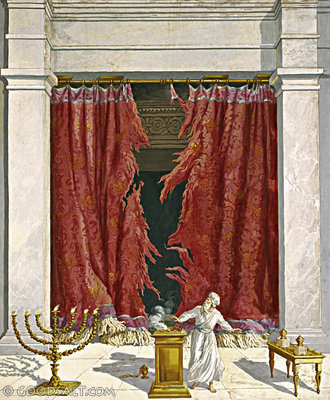 |
| Torn veil |
A wise old woodsman provided the following wisdom about the art of surviving bear encounters: "Son, try to avoid them, if possible! But if you can't and it's a female you run into, don't ever get between mama and her cubs. Because if you do there's fixin' to be a meeting, and you're gonna be on the receiving end!" The word for "meet" is our Hebrew word translated "intercession," paga. Other Hebrew words could have been used, but this one was chosen partly because it often has a very violent connotation. In fact, paga is frequently a battlefield term (for examples see: Judges 8:21; Judges 15:12; 1 Samuel 22:17, 18; 2 Samuel 1:15; 1 Kings 2:25-46).
Intercession can be violent! Meetings can be unpleasant! Some can be downright ugly! Such as the one Satan had with Jesus at Calvary when Christ interceded for us. Satan had come between God and His "cubs." He ought not to have done that! Satan's worst nightmare came true when with 4,000 years of pent-up fury, Jesus met him at Calvary. The earth rocked, and I do mean literally, with the force of the battle (see Matthew 27:51). The very sun grew dark as the war raged (see Matthew 27:45). At the moment of what Satan thought was his greatest triumph, he and all his forces heard the most terrifying sound they had ever heard, God's laugh of derision! (see Psalm 2:4).
The laughter was followed by the voice of the Son of man crying with a loud voice, "Tetelestai." This Greek word is translated "It is finished" in John 19:30. Please don't think Jesus was talking about death when He spoke that word. No way! Tetelestai means to fully accomplish something or bring it to its completed state as the word finished would imply, but it was also the word stamped on invoices in that day meaning, "Paid in full." Jesus was shouting, "The debt is paid in full!" Hallelujah! Christ was quoting from Psalm 22:31 when He chose this statement. Three of His seven sayings on the Cross come from this Psalm.
The Hebrew word He quoted from this verse is asah. He may have actually been speaking Hebrew, using this very word, even though John recorded it in Greek. The word means, among other things, "to create." It is used in Genesis, for example, when God created the earth. I believe that not only was Christ saying, "The debt is paid in full," but also, "Come forth, new creation!" No wonder the earth shook, the sun reappeared, the centurion was terrified (see Matthew 27:54) and Old Testament saints were resurrected (see Matthew 27:52, 53). Don't tell me God doesn't have a flare for the dramatic. The Cross defines drama. And yes, behind the scenes it was violent. Captives were rescued (see 1 Peter 3:19; 1 Peter 4:6; Isaiah 61:1), bruises were inflicted (see Genesis 3:15; Isaiah 53:5; 1 Peter 2:24), keys were exchanged, authority was transferred (see Matthew 28:18).
An interesting word is used in 1 John 3:8 (KJV) that adds insight to what happened at the Cross. The verse reads, "For this purpose the Son of God was manifested, that he might destroy the works of the devil." Destroy is the Greek word, luo, which has both a legal and a physical meaning. Understanding its full definition will greatly enhance our knowledge of what Jesus did to Satan and his works.
The legal meaning of luo is (1) to pronounce or determine that something or someone is no longer bound; (2) to dissolve or void a contract or anything that legally binds. Jesus came to dissolve the legal hold Satan had over us and to pronounce that we were no longer bound by his works. He "voided the contract," breaking his dominion over us.
The physical meaning of luo is to dissolve or melt, break, beat something to pieces or untie something that is bound. In Acts 27:41 the boat Paul traveled on was broken to pieces (luo) by the force of a storm. In 2 Peter 3:10, 12 we're told that one day the elements of the earth will melt or dissolve (luo) from a great heat. Jesus not only delivered us legally, but He also made certain the literal consequences of that deliverance were manifested: He brought healing, set captives free, lifted oppression and liberated those under demonic control.
Shalom,
Rev. Obadiah Swen
Pastor, BWOC-VA

No comments:
Post a Comment